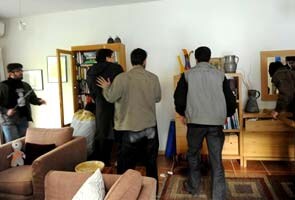
Tehran:
Iran has released 11 hardline protesters detained for storming the British Embassy and diplomatic compounds in Tehran this week, the semi-official Fars news agency said Thursday.
Fars said 11 people, described as students, were set free late on Wednesday, a day after they were arrested for storming and ransacking the embassy and British diplomatic compounds in Tehran.
There was no immediate explanation for the release. Under Iranian law, damaging property carries a prison term of up to three years. It could, however, indicate the 11 have high-level protection from circles within the Iranian establishment.
The storming of the compounds was preceded by an apparently state-approved rally outside the British Embassy to denounce Britain's support for the latest round of U.S. sanctions on Iran over its controversial nuclear program.
The incident has deepened Iran's isolation and significantly escalated tensions with the West.
It prompted Britain to pull its diplomats out of Iran, shutter the ransacked embassy and order all Iranian diplomats out of the U.K. within 48 hours. Germany, France and the Netherlands have recalled their ambassadors in solidarity.
Tuesday's rampage went on for hours, with the mob hauling down Union Jack flags, torching a vehicle and tossing looted documents through windows. Protesters replaced the British flag with a banner in the name of a 7th-century Shiite saint, Imam Hussein, and one looter showed off a picture of Queen Elizabeth II apparently taken off a wall.
President Mahmoud Ahmadinejad has remained silent on the incident but Iran's foreign ministry expressed regret and called the embassy assault "unacceptable."
However, hard-liners have spoken out in support of the protesters. Mohammad Mohammadian, a representative of Iran's Supreme Leader Ayatollah Ali Khamenei, praised the attackers, saying they had targeted the "epicenter of sedition."
And Iran's Parliament Speaker Ali Larijani said the "wrath of (the protesters) resulted from several decades of domination-seeking behavior of Britain."
The storming of the embassy came two days after Iran's parliament voted to reduce ties with Britain following London's support for the recently upgraded U.S. sanctions on Tehran.
British Foreign Minister William Hague claimed those involved in Tuesday's attack were members of a student group allied with the Iranian Revolutionary Guard's paramilitary Basij organization, which recruits heavily on university campuses.
Hague told Parliament the private quarters of staff and Britain's ambassador were trashed in the attack and that diplomats' personal possessions were stolen.
"This is a breach of international responsibilities of which any nation should be ashamed," Hague said Wednesday.
Tehran's relations with Britain have become increasingly strained over the past few months, largely driven by increasing tensions over Tehran's refusal to halt uranium enrichment - a process that can lead to nuclear arms. The West says Iran is developing atomic weapons; Tehran denies the claims.
Fars said 11 people, described as students, were set free late on Wednesday, a day after they were arrested for storming and ransacking the embassy and British diplomatic compounds in Tehran.
There was no immediate explanation for the release. Under Iranian law, damaging property carries a prison term of up to three years. It could, however, indicate the 11 have high-level protection from circles within the Iranian establishment.
The storming of the compounds was preceded by an apparently state-approved rally outside the British Embassy to denounce Britain's support for the latest round of U.S. sanctions on Iran over its controversial nuclear program.
The incident has deepened Iran's isolation and significantly escalated tensions with the West.
It prompted Britain to pull its diplomats out of Iran, shutter the ransacked embassy and order all Iranian diplomats out of the U.K. within 48 hours. Germany, France and the Netherlands have recalled their ambassadors in solidarity.
Tuesday's rampage went on for hours, with the mob hauling down Union Jack flags, torching a vehicle and tossing looted documents through windows. Protesters replaced the British flag with a banner in the name of a 7th-century Shiite saint, Imam Hussein, and one looter showed off a picture of Queen Elizabeth II apparently taken off a wall.
President Mahmoud Ahmadinejad has remained silent on the incident but Iran's foreign ministry expressed regret and called the embassy assault "unacceptable."
However, hard-liners have spoken out in support of the protesters. Mohammad Mohammadian, a representative of Iran's Supreme Leader Ayatollah Ali Khamenei, praised the attackers, saying they had targeted the "epicenter of sedition."
And Iran's Parliament Speaker Ali Larijani said the "wrath of (the protesters) resulted from several decades of domination-seeking behavior of Britain."
The storming of the embassy came two days after Iran's parliament voted to reduce ties with Britain following London's support for the recently upgraded U.S. sanctions on Tehran.
British Foreign Minister William Hague claimed those involved in Tuesday's attack were members of a student group allied with the Iranian Revolutionary Guard's paramilitary Basij organization, which recruits heavily on university campuses.
Hague told Parliament the private quarters of staff and Britain's ambassador were trashed in the attack and that diplomats' personal possessions were stolen.
"This is a breach of international responsibilities of which any nation should be ashamed," Hague said Wednesday.
Tehran's relations with Britain have become increasingly strained over the past few months, largely driven by increasing tensions over Tehran's refusal to halt uranium enrichment - a process that can lead to nuclear arms. The West says Iran is developing atomic weapons; Tehran denies the claims.
Track Latest News Live on NDTV.com and get news updates from India and around the world

